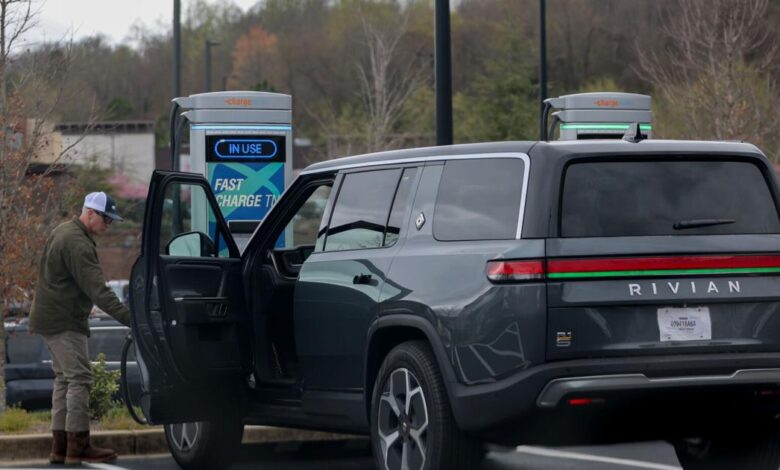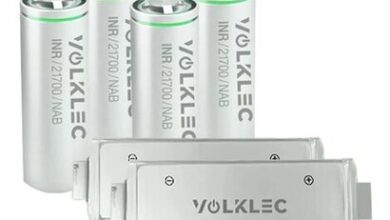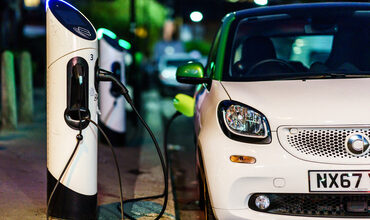Region has increasing number of electric vehicle chargers

TownNews.com Content Exchange ConsumerAffairs’ ranking is based on the number of charging stations available per 1,000 registered EVs in each state. The above graph provides the metrics on the total number of available charging stations, the total number of planned charging stations in development, the number of stations per 100,000 people, and the number of stations per 100,000 square miles. 1. North Dakota Although located in the north-central part of the country — where there are still big gaps in EV infrastructure — North Dakota has the most available charging stations per registered EV in the nation. However, as one of the least populated states, it is the third-lowest-ranked in the country in terms of total available charging stations.
in April 2023 to allow transportation officials to distribute $26.9 million awarded to the state through NEVI funds to develop charging stations across the state’s highways. 2. Wyoming As the nation’s least populated state, Wyoming presents an interesting landscape for EV adoption and charging infrastructure. Despite having fewer than 1,000 registered EVs, the state’s ratio of available stations per registered EV is well above the national average. While the presence of charging infrastructure is currently outpacing the deployment of EVs in the state, the rollout of federal funding has faced some challenges. Some state legislators are battling a NEVI policy requiring charging stations to be installed every 50 highway miles, no matter how remote the site is. While Wyoming’s NEVI
was approved in September 2022, the state’s request for exemption to the 50-mile rule was denied. 3. Maine Although it is one of the 10 least populated states in the country, Maine has an outstanding availability of charging stations compared to EV registrations. While it still features a low EV adoption rate relative to its population, Maine’s presence of charging stations per square mile is just below the national average. The state counts on $15 million in deferral grants to fulfill its plan of installing nearly 600 EV charging stations in more than 70 cities and towns. However, amid the rollout of the funds, the state rejected in March a
that would have required 82% of vehicles sold in the state to be electric by 2032. 4. West Virginia Nestled in the Appalachian region, West Virginia is also a key player in the realm of EVs and charging stations. Although the presence of EV charging stations remains low when compared with the state’s population, West Virginia has one of the highest rates of charging stations per registered EV — a count that is still growing relative to population as adoption rates rise. As West Virginia prepares for the next phase of its proposed electric vehicle infrastructure plan in July, the state’s transportation department is still determining the vendor to build out the stations planned in the first phase of the NEVI-funded program. 5. South Dakota Falling slightly behind West Virginia, South Dakota has 82 charging stations per 1,000 registered EVs, standing firmly above the national average of 27. The state also has a low number of EVs per 100,000 residents, but its ratio of charging stations per registered vehicle suggests it has a strong infrastructure to support a growth in demand for EVs. That could be a motivating factor in incentivizing the continued adoption of electric cars. If rollout plans are approved, the state will receive close to $26 million in federal funding to support EV infrastructure through 2026. In addition to NEVI funds, South Dakota announced that it has
$1.2 million available for EV infrastructure
through the Volkswagen trust fund. 6. Rhode Island Rhode Island is also one of the country’s least populated states, but it is highly ranked in its availability of charging stations per EV. While it has fewer registered EVs, its 337 charging stations provide high availability to the 4,340 registered EVs in the state. Reflected through small numbers, Rhode Island offered an impressive 78 charging stations per 1,000 registered EVs, standing well above the national average of 27. In December, Rhode Island Gov. Dan McKee
the start of construction for the state’s first EV charger projects under the NEVI program. 7. Vermont As the second-least populated state in the nation, Vermont might not be known for its high presence of EVs and charging stations. However, it has the second-highest number of available stations relative to population size, with 60 stations available per 100,000 residents. Vermont is also highly regarded in station availability, offering 74 stations per 1,000 EVs. Gov. Phil Scott further highlighted his state’s commitment to EVs in April when he
the opening of Vermont’s first federally funded EV fast charger, making it the sixth state in the country to install such chargers under the NEVI program. 8. Kansas With 72 available charging stations per 1,000 EVs, Kansas ranks eighth in EV charging availability nationwide. The state’s 7,550 registered EVs place it in the bottom half of states in EV adoption. However, its high availability of charging stations, offering 546 to date, demonstrates a high ratio of available stations per EV. In January, the development of six new fast-charging stations funded through the NEVI program was
as an effort to fill EV charging station gaps along the state’s major highways. 9. Missouri While middle-ranked in its overall EV presence, Missouri is among the top 10 states with the most charging stations per registered EV. The state features 1,251 available charging stations for its 17,870 registered EVs, creating a comfortable ratio of 70 stations per 1,000 EVs. These numbers could motivate continued EV adoption in the state, as the infrastructure for growth in demand is already available. 10. Mississippi Finally, with 67 available charging stations per 1,000 registered EVs, Mississippi ranks 10th in the country. While the state’s ratio of charging stations to EVs is well above the national average, it is ranked second lowest in terms of available stations relative to population. The state is set to add about 30 stations funded through $50 million awarded by federal funding from the NEVI program.
Bottom 10 states for charging your electric vehicle
Unlike many states on ConsumerAffairs’ top 10 list, several states featured on the bottom 10 list boast higher populations. Often regarded as flagship states and hubs for EVs, many of them have a relatively high number of available charging stations. However, an even higher rate of EV adoption can lead to competition for charging stations. 50. New Jersey While it’s one of the more densely populated states in the nation and features a high level of EV adoption, with over 87,000 registered EVs, New Jersey is ranked 50th in the country in terms of the ratio of charging stations to registered EVs. With 16 charging stations per 1,000 registered EVs, the state holds a below-average ratio of available infrastructure to support demand. However, as a smaller state, New Jersey provides over 18,000 charging stations per 100,000 square miles — over 16,000 more available stations than the national average. New Jersey is one of a growing number of states that have announced a rule
prohibiting the sale of new gas-powered vehicles by 2035.
Following an expected increase in demand for EVs as a result of the rule, the state has nine additional planned charging stations that have begun the installation process. 49. Nevada A larger but relatively less densely populated state, Nevada has nearly 33,000 registered EVs but presents a low ratio of available charging stations. The state stands well below the national average, with 18 available charging stations per 1,000 registered EVs. The state also falls below the national average of 1,728 available stations per 100,000 square miles, featuring only 550 available charging stations across that area. The lack of charging stations based on area is primarily due to Nevada’s vast rural areas, making the state a key example of President Joe Biden’s focus vision to install charging stations every 50 miles to improve connectivity. With $38 million to be distributed from NEVI funding, Nevada
its second rollout year of funding in September to deploy infrastructure across the state’s rural areas. 48. California Often at the forefront of EV initiatives, California leads the nation in the total number of charging stations and registered EVs. The state holds 37% of the nation’s EV population and 25% of all available charging stations. However, its availability of 18 charging stations per 1,000 registered EVs falls below the national average of 27. California is still ranked in the top 5 states in the country when considering its availability of charging stations per 100,000. These trends indicate that demand for EVs in California could be outpacing the state’s high investment and incentives to build supporting infrastructure. However, it is important to note that California’s lower ratio of charging stations to registered EVs could be attributed to it being in a later stage of EV deployment. Conditions in the state exemplify how market trends for demand-driven network growth tend to lead to a lower EV-to-charging-station ratio. In efforts to keep up with demand, California has the highest number of planned stations, with 44 additional EV charging stations that have already been sited and begun installation. California Gov. Gavin Newsom announced in April that the state has reached a milestone of having
one fast charging station for every five gas stations
. 47. Arkansas As a smaller and less populated state, Arkansas’ availability of 19 charging stations per 1,000 registered EVs is comparable to California’s. The state also has a similar ratio of 41 charging stations per 100,000 residents. Arkansas currently features 5,140 registered EVs and 326 available charging stations, but it is still in the early stages of EV adoption and infrastructure development. The state has been awarded $15 million in federal funding to install
to fill gaps on interstate highways. 46. Hawaii Hawaii’s availability of 19 charging stations per 1,000 registered EVs falls under the national average of 27. There are currently 19,760 registered EVs and 381 available stations in the state, and there are plans for five additional charging stations. The state’s first
NEVI-funded charging station was inaugurated in February
, making it the fourth state in the nation to see federal funding results come to life. 45. Illinois Also ranked in the bottom 10, Illinois has 66,880 EVs and 1,336 available charging stations — creating a ratio of 20 stations per 1,000 registered EVs. Illinois has 11 available charging stations per 100,000 residents and has no planned stations underway. While the state has lagged in installing EV charging stations, Illinois senators announced in January that nearly
had been awarded to the state to install charging infrastructure in 273 locations. 44. Florida Florida is another big player in the EV development realm. It ranks third in the country in the number of available charging stations, but its high level of EV adoption creates more competition to use its infrastructure. The state has 24 additional charging stations planned to bolster its infrastructure and meet the growing popularity of EVs. However,
could slow down or even cancel upcoming EV charging station projects. 43. Washington Ranked fourth in overall EV adoption in the country with over 104,000 registered EVs, Washington nevertheless ranks in the bottom 10 states on the list, featuring 22 available charging stations per 1,000 registered EVs. However, the state is ranked 10th in the country by another measure, with 29 available charging stations per 100,000 people. Washington’s commitment to EV adoption is demonstrated through several initiatives, including a commitment to
the sale of new gas-powered vehicles by 2035. Gov. Jay Inslee also announced an
to fund EV charging stations throughout the state and an
for low-income individuals looking to purchase or lease an electric vehicle. 42. Texas Ranked third in registered EVs and fourth in available charging stations nationwide, Texas is another prominent state in EV adoption and infrastructure development. However, state legislation might be slowing down EV adoption. A law passed in 2023 requires EV owners to pay an additional
$200 or $400 fee to register their vehicles
, and the state is leading a challenge to the
The state has another 42 charging stations planned for future deployment. 41. Oklahoma Rounding out the list of the bottom 10 states for charging your EV is Oklahoma, which has 362 available stations for over 16,000 registered EVs. This creates a ratio of 22 charging stations per 1,000 EVs, placing the state below the national average. Relative to population and land area, Oklahoma is also ranked in the bottom 8 and 11, respectively, in EV infrastructure development. In April, the state’s Transportation Commission approved over
$8 million in awards to three companies to build 13 EV charging stations
along interstates.



